The mirth and misogyny of Andy Capp
- Published
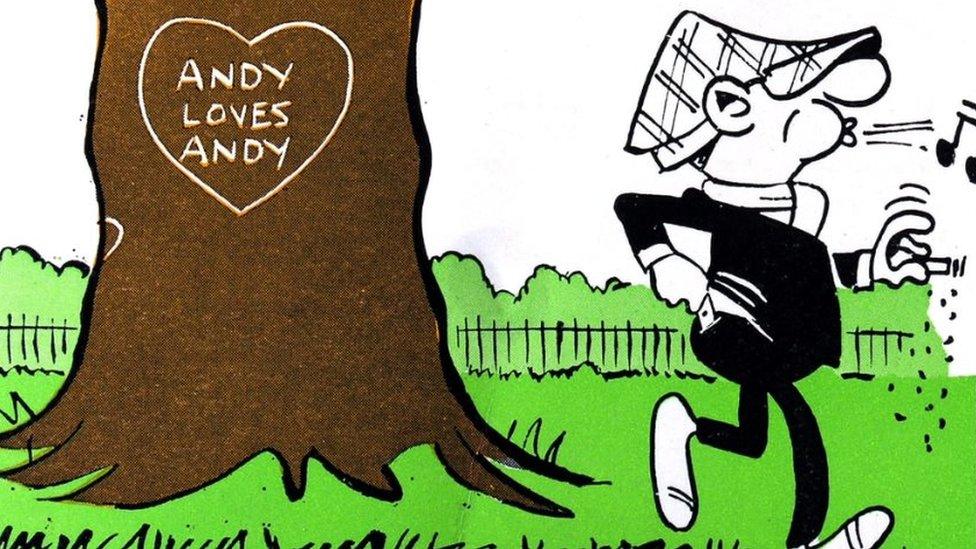
Andy Capp has appeared in more than 20,000 cartoon strips around the world
Andy Capp was a product of the 1950s - an era when newspapers dominated and domestic violence was still a mainstream source of humour. Why, almost 60 years after he first appeared in the Daily Mirror, is a layabout lout from north-east England still popular?
Homer Simpson called him a "wife-beating drunk" while his creator Reg Smythe said he was a "horrible little man".
Yet the stereotypical, flat cap-wearing northerner from Hartlepool has clocked up more than 20,000 cartoon strips in newspapers around the world since 1957 - and is still going strong.
Although his ability to shirk work remains unaltered, Andy has had to change to suit society, says Nick Hiley, of the British Cartoon Archive.
It has more than 2,800 Andy Capp sketches from his first 10 years in the Daily Mirror - a shocking 140 of which contain examples of domestic violence.
"Some of the early cartoons are really unpalatable nowadays because of the vicious way he treats Flo," Mr Hiley said.
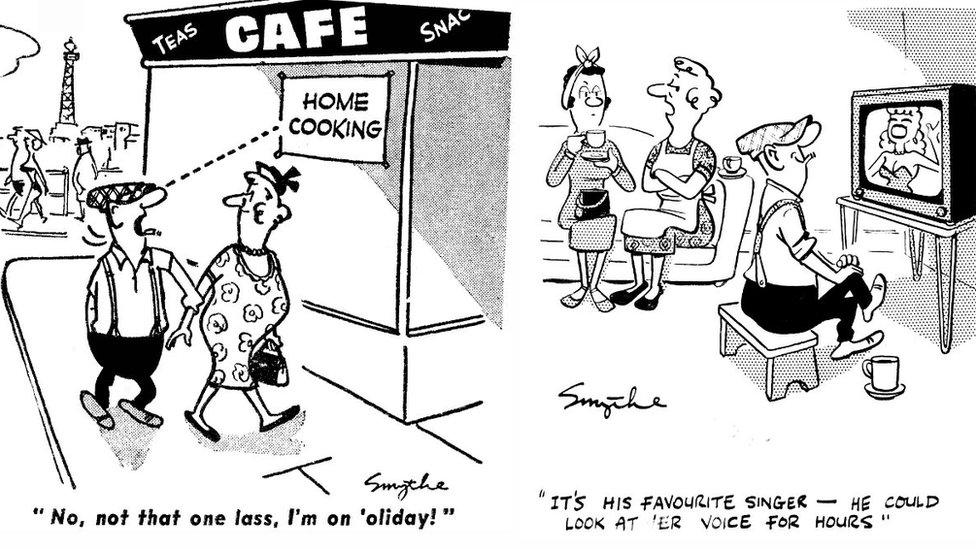
Andy Capp first arrived in 1957, the cartoon on the left is the first ever sketch and appeared in the Daily Mirror's northern edition on 5 August
"He knocks her out and knocks her about. The first strip in the first Andy Capp album is him saying how one of his pleasures is beating up [his wife] Flo.
"His violence was quite acceptable to the newspapers and the readers probably because domestic violence itself was considered acceptable at the time."
Smythe later said he regretted his character's violence towards Flo, saying: "He was too savage, a proper bully."
It should be pointed out that the violence was not just in one direction - in some, the long-suffering Flo was the aggressor too.
But only labelling the character a wife-beater is wrong, says Fergus McKenna, head of syndication at Trinity Mirror, publisher of the Daily Mirror.
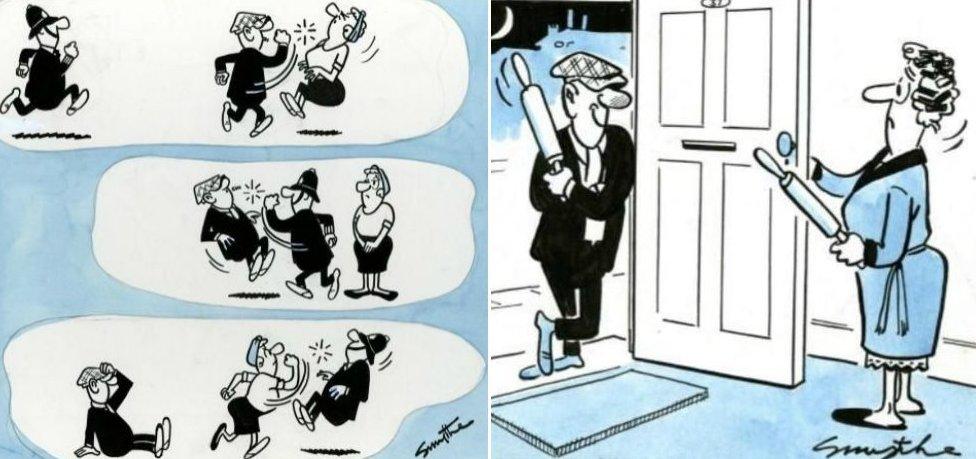
Many of the early cartoons depicted domestic violence
"Andy was very much of his time, even so I knew Reg regretted some of Andy's actions," he said.
"He was not celebrating what Andy was doing, it was probably more of a criticism.
"There is always a danger of looking at history through a modern prism and saying 'well he shouldn't be doing that'. He isn't doing it today."

Where did Reg Smythe find Andy Capp?
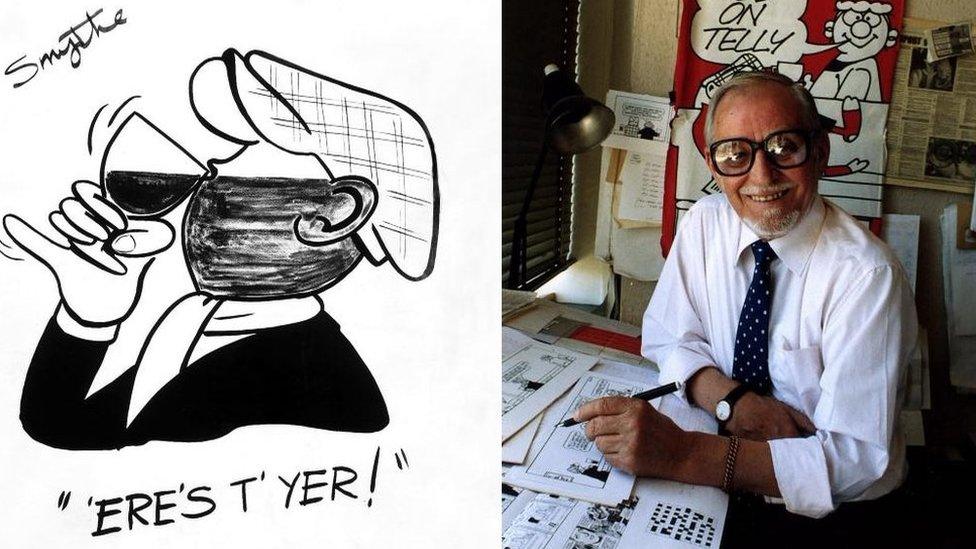
Andy Capp was created by Reg Smythe for the Daily Mirror in 1957
One of the favourite theories about the origin of Andy Capp is he and his wife were based on Smythe's parents, his mother also being called Flo.
Smythe also reportedly told a colleague that Capp was inspired by a man he saw at a Hartlepool football match who pocketed his flat cap when it started raining.
"You don't think I'm going to sit in the house all night wearing a wet cap?" he told a young Smythe.
Smythe himself may also have been somewhat of an inspiration. After his death in 1998, Daily Mirror cartoon editor Ken Layson recalled visiting the cartoonist and his wife Vera.
"After she had poured Reg his tea, he looked at his cup and shouted to her that something was not right.
"Vera walked back and, without another word, turned the cup so the handle was pointing in the right direction."
Smythe claimed the idea for Andy Capp was born on the A1 as he was driving to London to meet the Mirror, who had asked him to come up with a comical character for the paper's Manchester edition.
"He may be a horrible little man but he has been good to me," Smythe once said.

The Women's Aid charity, which was set up in the 1970s to support women who were victims of physical or sexual abuse, said attitudes towards domestic violence had changed.
"The problem is women are still unequal in many ways, you do not have cartoons in national newspapers making jokes about domestic abuse anymore but domestic abuse is still trivialised in other ways.
"For example T-shirts with jokes about rape or the criminal justice system failing to give tough sentences to perpetrators."
While few would lament the loss of violence in the Andy Capp strips, there was genuine outrage when Andy quit smoking in 1983.
Fans complained he was becoming too politically correct, but the reason he quit was more personal.
"The truth is that Reg himself gave up smoking and he said there was no way Andy was going to carry on enjoying cigarettes when Reg couldn't," Mr McKenna said.
"There was certainly no pressure on him [from The Mirror] to make Andy stop smoking."
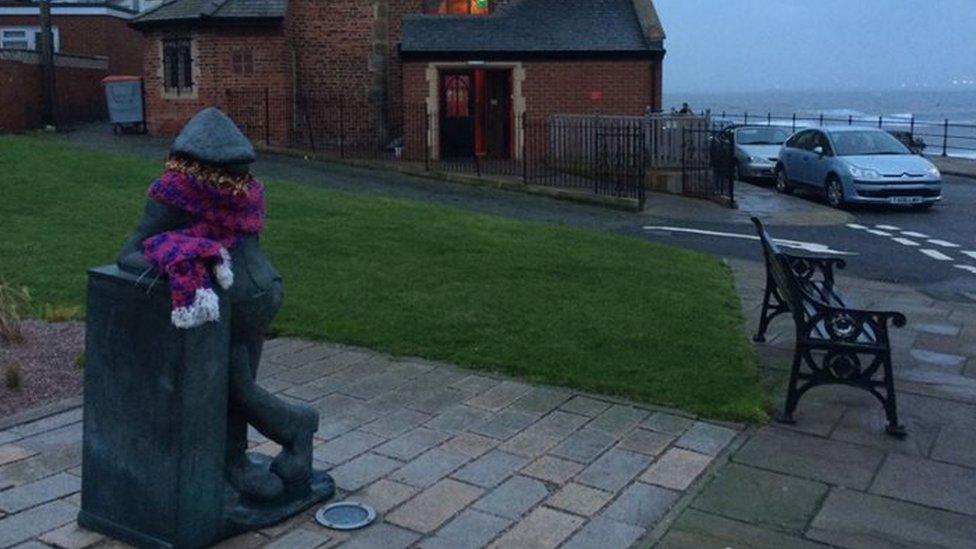
A statue of Andy Capp was erected in Smythe's hometown of Hartlepool in 2007
Despite splitting opinion, Capp is still incredibly popular and one of the most syndicated cartoon characters ever produced.
He can be found in more than 300 newspapers in North America and has appeared in publications across Europe, including in Russia during the Cold War, South America, Asia and Australia.
In 1982 Tom Courtenay played Andy Capp in a stage musical version while the character has also been adapted for TV and radio and sold everything from talcum powder to tea towels.
On Wednesday a collection of Andy Capp memorabilia, including rare original drawings by Reg Smythe, is going under the hammer at Tennants Auctioneers in Leyburn, North Yorkshire.
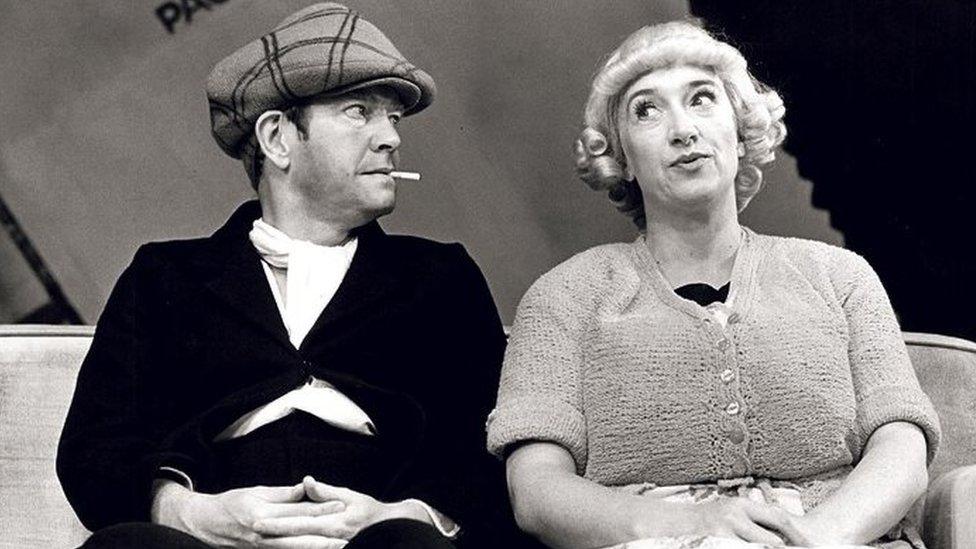
Andy Capp was turned into a musical in 1982 with Tom Courtenay playing Andy and Val McLane his wife Flo
"The importance of the character is his universality," Mr Hiley said.
"He has a feeling of being a rebel, a man ploughing his own furrow."
Mr McKenna said Andy Capp resonates with readers around the world.
"I would hesitate to call Andy Capp an everyman - because I know he is not everyone's cup of tea - but he likes drinking beer, having nights out and watching sport, things blokes like whether they are living in Hartlepool or Honolulu," he said.
Andy Capp epitomised both the humour of the northern working class and the golden age of the newspaper cartoon strip, according to Sunderland-based graphic novelist Bryan Talbot.
"I first came across Andy Capp when I was two or three," said Mr Talbot, author of Alice in Sunderland.
"He was a very funny character, that's why he has lasted so long.
"He had a very dry humour, the same sort of humour you saw in the Likely Lads, a very northern character who has been syndicated in newspapers around the world."
In the heyday of cartoon strips characters like Andy Capp could be the reason people bought a particular newspaper, Mr Talbot said.
Andy Capp still has a strong future at The Mirror, according to Mr McKenna.
"He will be 60 next year so we are planning a celebration for that.
"Andy Capp is still a much-loved character and I see no reason why he won't have a long and happy future."
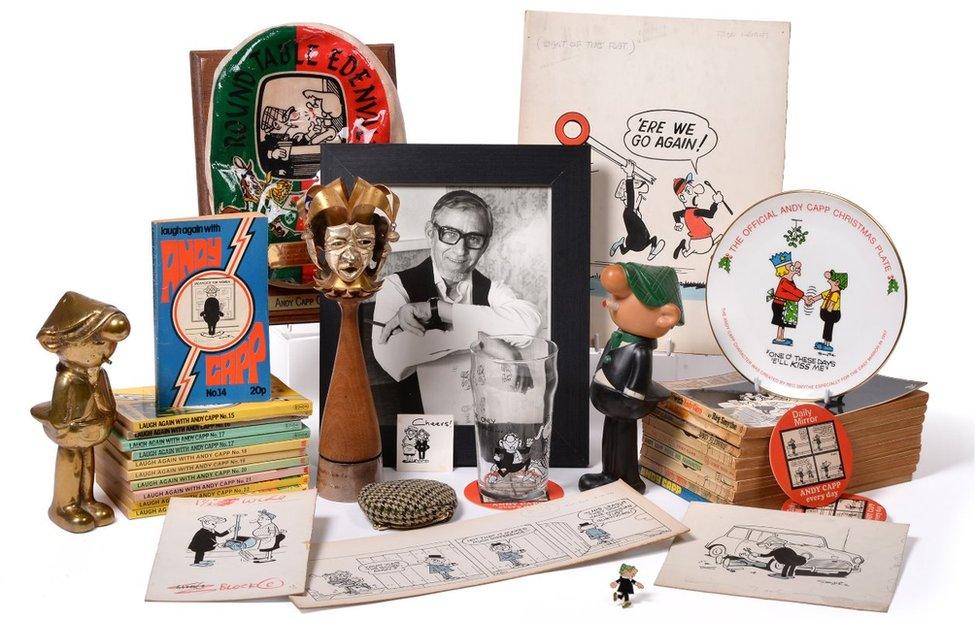
A collection of Andy Capp memorabilia is being auctioned